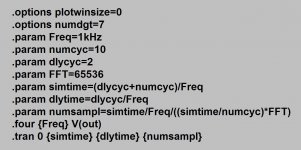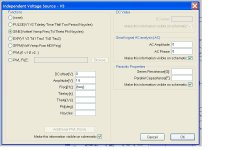Hello everybody, i an newbee in audio amp simulation. i am using TINA 8 industrial version spice program. i am learning step by step to use it . i learned lot of things about simulation but i dont know how to measure THD,IMD with spice. i also have LT spice but same problem with it. actually, i want to see how transistor types and bias setting affects THD and i also want to know how accurate it is? kindly help.
Hi Samlo,
There are lot's of thread's in this forum regarding this issue.
In the attached picture is the way I manage this (a copy from on this forum) a FFT analysis.
These should be written in your LTspice .asc file.
Behind the .four commando is the signal of where you wan't to have the fourrier analysis from. All the parameters between {} are variables.
For you input signal frequency you can use for example the variable {Freq}, this way you only have to change one parameter to have all the rest ok.
Hope I helped you a bit.
There are lot's of thread's in this forum regarding this issue.
In the attached picture is the way I manage this (a copy from on this forum) a FFT analysis.
These should be written in your LTspice .asc file.
Behind the .four commando is the signal of where you wan't to have the fourrier analysis from. All the parameters between {} are variables.
For you input signal frequency you can use for example the variable {Freq}, this way you only have to change one parameter to have all the rest ok.
Hope I helped you a bit.
Attachments
actually spice always has to interpolate for even sample times so the exact numsamples calculation is wasted
just use a .tran T_maxstep setting small enough to give (lots) more points than the fft
the .four is pretty old - most today like the much greater info from the fft plot that gives the releative amplitudes, distribution in a nice graphical presentation
the Software Tools sub forum has more spice, Ltspice threads
just use a .tran T_maxstep setting small enough to give (lots) more points than the fft
the .four is pretty old - most today like the much greater info from the fft plot that gives the releative amplitudes, distribution in a nice graphical presentation
the Software Tools sub forum has more spice, Ltspice threads
TINA is quite good, but I prefer LTspice. Firstly because it runs well in Wine underLinux (which is how I use it). Secondly, because it is easy to add your own symbols and models. Might be that TINA could do it equally well, but I never progressed that far.
I also tried Pspice and Microcap, but they are only available in demo versions to the financially challenged. The Microcap demo limits you to 50 components. You can get by with that, but sooner or later it will not be enough. The Pspice demo limits you to 10 transistors and that is just ridiculous.
On this topic, is it possible to vary the temperature of transistors in LTspice? Probably just a SPICE directive away, but I still have to figure it out. Maybe I should just read the manual.
I also tried Pspice and Microcap, but they are only available in demo versions to the financially challenged. The Microcap demo limits you to 50 components. You can get by with that, but sooner or later it will not be enough. The Pspice demo limits you to 10 transistors and that is just ridiculous.
On this topic, is it possible to vary the temperature of transistors in LTspice? Probably just a SPICE directive away, but I still have to figure it out. Maybe I should just read the manual.
In Tina you have a sptectrum analyzer . It is very easy to mesure distortion or intermodulation with this instrument .
Ajust the range (max level , expected low level(in dB) , min and max Hz ) select blackman convolution and amplitude spectrum .
Wait computation and see .
There is one bug with the oscillator , he is not clean over one decade . It is better to observe only the first decade after fondamental at low level of distortion (blameless) .
The next question is what mean this value in real world ?
Ajust the range (max level , expected low level(in dB) , min and max Hz ) select blackman convolution and amplitude spectrum .
Wait computation and see .
There is one bug with the oscillator , he is not clean over one decade . It is better to observe only the first decade after fondamental at low level of distortion (blameless) .
The next question is what mean this value in real world ?
- Status
- Not open for further replies.

